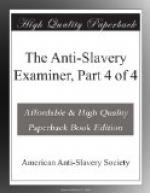In its worst forms, we are told, slavery prevailed over the whole world, not excepting Judea. As, according to such ecclesiastics as Stuart, Hodge and Fisk, slavery in itself is not bad at all, the term “worst” could be applied only to “abuses” of this innocent relation. Slavery accordingly existed among the Jews, disfigured and disgraced by the “worst abuses” to which it is liable. These abuses in the ancient world, Professor Stuart describes as “horrible cruelties.” And in our own country, such abuses have grown so rank, as to lead a distinguished eye-witness—no less a philosopher and statesman than Thomas Jefferson—to say, that they had armed against us every attribute of the Almighty. With these things the Savior every where came in contact, among the people to whose improvement and salvation he devoted his living powers, and yet not a word, not a syllable, in exposure and condemnation of such “horrible cruelties” escaped his lips! He saw—among the “covenant people” of Jehovah he saw, the babe plucked from the bosom of its mother; the wife torn from the embrace of her husband; the daughter driven to the market by the scourge of her own father;—he saw the word of God sealed up from those who, of all men, were especially entitled to its enlightening, quickening influence;—nay, he saw men beaten for kneeling before the throne of heavenly mercy;—such things he saw without a word of admonition or reproof! No sympathy with them who suffered wrong—no indignation at them who inflicted wrong, moved his heart!
From the alleged silence of the Savior, when in contact with slavery among the Jews, our divines infer, that it is quite consistent with Christianity. And they affirm, that he saw it in its worst forms; that is, he witnessed what Professor Stuart ventures to call “horrible cruelties.” But what right have these interpreters of the sacred volume to regard any form of slavery which the Savior found, as “worst,” or even bad? According to their inference—which they would thrust gag-wise into the mouths of abolitionists—his silence should seal up their lips. They ought to hold their tongues. They have no right to call any form of slavery bad—an abuse; much less, horribly cruel! Their inference is broad enough to protect the most brutal driver amidst his deadliest inflictions!
“THINK NOT THAT I AM COME TO DESTROY
THE LAW OR THE PROPHETS;
I AM NOT COME TO DESTROY,
BUT TO FULFIL.”
And did the Head of the new dispensation, then, fall so far behind the prophets of the old in a hearty and effective regard for suffering humanity? The forms of oppression which they witnessed, excited their compassion and aroused their indignation. In terms the most pointed and powerful, they exposed, denounced, threatened. They could not endure the creatures, “who used their neighbors’ service without wages, and gave him not for his work;"[6] who imposed “heavy burdens"[7] upon their fellows,




